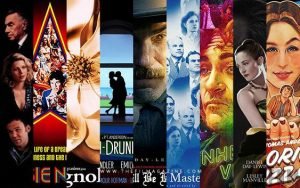Claude Chabrol: A Master of Psychological Thrillers in French Cinema
Claude Chabrol was a renowned French film director, screenwriter, and producer who was a master of psychological thrillers in French cinema. Throughout his career, Chabrol explored the dark and complex nature of human psychology through his films, which often centered around murder, betrayal, and deception. His unique approach to storytelling, combined with his impeccable direction and attention to detail, cemented his place as one of the greatest filmmakers in French cinema history. In this article, we explore Chabrol’s contribution to the world of psychological thrillers in French cinema and the impact of his work on the genre.
Claude Chabrol was a renowned French film director, screenwriter, and producer who was a master of psychological thrillers in French cinema. Throughout his career, Chabrol explored the dark and complex nature of human psychology through his films, which often centered around murder, betrayal, and deception. His unique approach to storytelling, combined with his impeccable direction and attention to detail, cemented his place as one of the greatest filmmakers in French cinema history. In this article, we explore Chabrol’s contribution to the world of psychological thrillers in French cinema and the impact of his work on the genre.

Introduction to Claude Chabrol and his work in French cinema
Claude Chabrol was a renowned French film director, screenwriter, and producer who is best known for his psychological thrillers. He began his career as a critic for the movie magazine Cahiers du Cinéma in the 1950s and became part of the influential “New Wave” movement in French cinema. Chabrol’s films often explored the dark side of human nature and were characterized by their intricate plots, tension-filled storytelling, and complex characters. He directed over 70 films in his career, including classics like Les Biches, La Cérémonie, and Le Boucher. Chabrol’s contribution to French cinema has made him one of the most celebrated filmmakers of all time.
Overview of the psychological thriller genre in film
The psychological thriller genre in film is known for its ability to captivate and intrigue audiences with its suspenseful plots and mind-bending narratives. This genre delves deep into the human psyche to explore the darker aspects of the human mind. French director Claude Chabrol is known for his contributions to the psychological thriller genre in French cinema. His films often revolve around unconventional characters and explore themes of deception, betrayal, and the inner workings of the human mind. Chabrol’s unique take on the genre has made him a well-respected figure in the world of cinema.
The role of suspense and tension in Chabrol’s films
Claude Chabrol‘s psychological thrillers are known for their masterful use of suspense and tension to keep the audience on the edge of their seats. From the subtlest of hints to the most dramatic of twists, Chabrol’s films are a masterclass in building tension and creating a sense of unease. With his keen eye for detail and his ability to make even the most mundane scenes feel suspenseful, Chabrol is widely regarded as one of the greatest suspense directors in French cinema history. Whether you’re a fan of his early work or his later, more experimental films, there’s no denying the power of Chabrol’s ability to keep audiences guessing until the very end.

Chabrol’s use of character development to create a sense of unease in his audience
Claude Chabrol is known for his masterful use of character development to create a sense of unease in his audience. In his psychological thrillers, such as “La Femme Infidele” and “Le Boucher,” Chabrol slowly reveals the complex and often disturbing inner lives of his characters. By doing so, he not only adds depth and realism to his films, but also creates a sense of tension and unease that is palpable throughout. Rather than relying on cheap scares or jump scares, Chabrol uses his characters to instill a sense of dread that lingers long after the film is over.
The role of gender and power dynamics in Chabrol’s films
Claude Chabrol, the renowned French filmmaker, is known for his psychological thrillers that provide a deep insight into the human psyche. One of the recurring themes in Chabrol’s films is the role of gender and power dynamics. Throughout his films, we see male characters dominating and manipulating women, often leading to disastrous consequences. Chabrol’s portrayal of gender roles and power dynamics is complex and nuanced, highlighting the underlying power struggles that exist within relationships. His films often explore the dark side of human nature, and the role of gender and power dynamics in shaping our behavior is a central theme that runs through many of his works.
The influence of classic literature on Chabrol’s storytelling
Claude Chabrol, known for his psychological thrillers in French cinema, was heavily influenced by classic literature in his storytelling. Chabrol’s love for the works of Balzac, Flaubert, and Maupassant is evident in his attention to character development and psychological depth in his films. In his films, Chabrol often explores the dark underbelly of human nature, similar to the themes found in the works of the classic literary authors he admired. His films feature complex and flawed characters, with intricate plot twists and turns that keep the audience on the edge of their seats. Chabrol’s storytelling style continues to be praised by film critics and fans alike, showcasing the timeless influence of classic literature on cinema.

The use of setting and atmosphere to enhance the psychological impact of Chabrol’s films
Claude Chabrol was a master of utilizing the setting and atmosphere to enhance the psychological impact of his films. In his psychological thrillers, such as “La Cérémonie” (1995) and “Merci Pour le Chocolat” (2000), Chabrol created a sense of unease and tension through the use of atmospheric settings like isolated mansions or small towns with hidden secrets. By immersing the audience in these unsettling environments, Chabrol was able to heighten the psychological impact of his stories and keep viewers on the edge of their seats. His attention to detail in creating realistic and immersive settings is a testament to his skill as a filmmaker and his dedication to creating a truly unforgettable cinema experience.
The critical reception of Chabrol’s work both in France and internationally
The critical reception of Chabrol’s work, especially his psychological thrillers, has been widely acclaimed both in France and internationally. His movies are known for their intricate plots, well-crafted characters, and expertly built suspense. Critics have praised his ability to delve deep into the human psyche and explore the darkest corners of the human mind. Chabrol’s movies have been compared to those of Hitchcock and have earned him the title “French Hitchcock.” His work has also been recognized with numerous awards and nominations, including the Golden Lion at the Venice Film Festival and the César Award for Best Director. Overall, Chabrol’s contribution to French cinema has been immense, and his legacy continues to inspire filmmakers worldwide.
Chabrol’s influence on contemporary French filmmakers and the legacy of his work
Claude Chabrol is considered one of the most influential filmmakers in the history of French cinema, particularly in the psychological thriller genre. His legacy in French cinema has been extensive, and his unique style has influenced a whole generation of contemporary French filmmakers. Chabrol’s films often explored the dark aspects of human nature, and his use of suspense and tension was masterful. His films continue to inspire and challenge young filmmakers today, and his influence is evident in the works of many contemporary French directors. His contribution to French cinema is undeniable, and his work will continue to be celebrated for years to come.
Conclusion reflecting on the enduring appeal of Chabrol’s psychological thrillers and their place in the canon of French cinema
In conclusion, it is clear that the enduring appeal of Claude Chabrol’s psychological thrillers lies in their ability to tap into the darker side of human nature while also providing a commentary on French society. With their tense psychological dramas, intricate plots, and strong performances, Chabrol’s films have earned a place in the canon of French cinema. From “Les Biches” to “La Cérémonie,” his movies continue to captivate audiences with their exploration of psychological complexities, moral ambiguity, and societal issues. Chabrol’s legacy as one of the greats of French cinema is secure, and his psychological thrillers will undoubtedly continue to be studied and enjoyed for years to come.
For more information about Claude Chabrol psychological thrillers French cinema, including movie details, cast information, etc..
check out the filmaffinity page.



